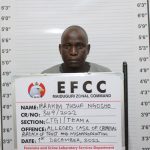...To get all news updates, Join our WhatsApp Group (Click Here)
Also Join our WhatsApp Channel (Click Here)
Nigerian National Based in Maryland Sentenced to 4 Years and 9 Months in Prison and Nigerian House Ordered Forfeited for Schemes to Steal Unemployment Insurance Benefits
Nigerian national Olamide Yusuf Bakare, 26, currently residing in Laurel, Maryland, was sentenced today to four years and nine months in prison for conspiracy to commit wire fraud during the COVID-19 pandemic, U.S. Attorney Phillip A. Talbert announced.
Bakare pleaded guilty in January 2023. According to court documents, between June 2020 and July 2021, Bakare, along with co-defendants Quazeem Owolabi Adeyinka and Ayodeji Jonathan Sangode, and others, participated in a conspiracy to submit fraudulent unemployment insurance (UI) and Pandemic Unemployment Assistance (PUA) claims to the States of Maryland and California.
More than 200 individual applications were filed with the California Employment Development Department (EDD) and the Maryland Department of Labor (MDOL), indicating that the claimants’ address was the Hyattsville, Maryland, apartment that the defendants shared.
During the conspiracy, the conspirators obtained the personally identifiable information (PII) of persons who were not eligible for UI or PUA benefits or who did not authorize the conspirators to act on their behalf with respect to seeking such benefits. Such PII included names, dates of birth, and Social Security numbers.
The conspirators then used the PII to submit dozens of fraudulent UI and PUA claims to EDD and MDOL under the putative claimants’ identities and without their authorization.
The underlying benefit applications contained fraudulent representations, including, for example, that the claimants had worked for certain employers and supervisors; had specific annual incomes; worked during certain time periods; were self-employed in various occupations; were laid off and had no work; were newly unemployed due to a disaster including the COVID-19 pandemic; and were currently available to work.
Most, if not all, of these claims were false because the claimants were not so previously working, employed, newly unemployed, or seeking new employment.
The conspirators knew that these representations were false or lacked the knowledge and authority to make such representations. These actions caused EDD and MDOL to approve at least 142 fraudulent UI and PUA claims.
For each approved claim, EDD and MDOL deposited benefit funds into a debit card account administered by Bank of America and under the identity of the putative claimant. Bank of America then mailed at least 142 unauthorized debit cards to addresses under the control of the defendants. Bakare then obtained these debit cards to withdraw cash at ATMs for the benefit of himself and his coconspirators.
During this conspiracy, Bakare also possessed three additional UI debit cards which had been issued by Maine’s Bureau of Unemployment Compensation, North Carolina’s Division of Employment Security, and Nevada’s Department of Employment Training and Rehabilitation. Each debit card was linked to an account that contained UI benefits. Bakare was not the named beneficiary on the cards or for the associated benefits, and he possessed them with intent to defraud the state agencies.
The debit cards that Bakare possessed and used during the conspiracy were linked to bank accounts that received a total of at least $2,265,844 in fraudulent UI and PUA benefits. He used this money, in part, to purchase a condominium in Lekki, Lagos State, Nigeria for N70 million. As part of the sentence, this asset was ordered forfeited.
This case is the product of an investigation by the Department of Labor – Office of the Inspector General, the Federal Bureau of Investigation, the Department of Homeland Security – Office of the Inspector General – Covid Fraud Unit, and the California EDD – Investigation Division.
Assistant U.S. Attorney Denise N. Yasinow is prosecuting the case.
Adeyinka pleaded guilty to conspiracy to commit wire fraud, and Sangode pleaded guilty to access device fraud. Both are scheduled to be sentenced by U.S. District Judge Dale A. Drozd on Aug. 22, 2023.
Adeyinka faces a maximum statutory penalty of 20 years in prison, and Sangode faces a maximum statutory penalty of 15 years in prison. Their actual sentences, however, will be determined at the discretion of the Court after consideration of any applicable statutory factors and the Federal Sentencing Guidelines, which take into account a number of variables.
This effort is part of a California COVID-19 Fraud Enforcement Strike Force operation, one of three interagency COVID-19 fraud strike force teams established by the U.S. Department of Justice.
The California Strike Force combines law enforcement and prosecutorial resources in the Eastern and Central Districts of California and focuses on large-scale, multistate pandemic relief fraud perpetrated by criminal organizations and transnational actors. The strike forces use prosecutor-led and data analyst-driven teams to identify and bring to justice those who stole pandemic relief funds.
You can get every of our news as soon as they drop on WhatsApp ...To get all news updates, Join our WhatsApp Group (Click Here)
Also Join our WhatsApp Channel (Click Here)

















